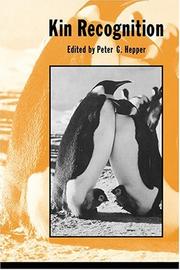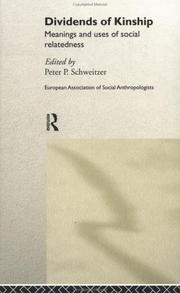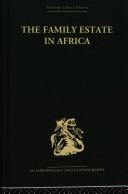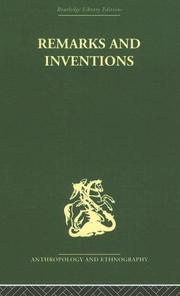| Listing 1 - 10 of 251 | << page >> |
Sort by
|
Book
ISBN: 0511876033 0511525419 Year: 1991 Publisher: Cambridge : Cambridge University Press,
Abstract | Keywords | Export | Availability | Bookmark
 Loading...
Loading...Choose an application
- Reference Manager
- EndNote
- RefWorks (Direct export to RefWorks)
Kin recognition, the ability to identify and respond differentially to one's genetic relatives, is one of the fastest growing and most exciting areas of ethology. Dr Hepper has brought together leading researchers in the field to create a thought-provoking and critical analysis of our current knowledge of the phenomenon, with particular emphasis on the underlying processes involved, and their significance for the evolution of social behaviour. Students of animal behaviour and evolutionary biology will find this book an invaluable source of information and ideas.

ISBN: 0521372674 9780521372671 9780511525414 9780521017558 Year: 1991 Publisher: Cambridge Cambridge University Press
Abstract | Keywords | Export | Availability | Bookmark
 Loading...
Loading...Choose an application
- Reference Manager
- EndNote
- RefWorks (Direct export to RefWorks)
Kin recognition in animals --- Kin recognition --- Kin recognition in animals. --- Kin recognition.
Book
ISBN: 0471911992 Year: 1987 Publisher: Chichester ; New York, NY ; Brisbane, Qld : John Wiley,
Abstract | Keywords | Export | Availability | Bookmark
 Loading...
Loading...Choose an application
- Reference Manager
- EndNote
- RefWorks (Direct export to RefWorks)

ISBN: 9781134739721 1280075112 0203449754 1134739737 9780203449752 9780415182836 0415182832 0415182832 0415182840 0203459806 9781134739684 9781134739738 9780415182843 1134739729 Year: 2000 Publisher: London Routledge
Abstract | Keywords | Export | Availability | Bookmark
 Loading...
Loading...Choose an application
- Reference Manager
- EndNote
- RefWorks (Direct export to RefWorks)
This collection reaffirms the importance of kinship, and of studying kinship, within the framework of social anthropology with examples from areas such as Austria, Greenland, Portugal, Turkey and the Amazon.
Kinship --- Families --- Ethnology --- Clans --- Consanguinity --- Kin recognition

ISBN: 0742509559 0742578895 9780742578890 9780742509559 Year: 2001 Publisher: Lanham Rowman & Littlefield Publishers
Abstract | Keywords | Export | Availability | Bookmark
 Loading...
Loading...Choose an application
- Reference Manager
- EndNote
- RefWorks (Direct export to RefWorks)
Visit our website for sample chapters!
Kinship. --- Ethnology --- Clans --- Consanguinity --- Families --- Kin recognition

ISBN: 1136529055 1136529128 1315017245 9781136529054 9781315017242 9781136529191 1136529195 9781136529122 9781138861800 1138861804 041532985X 9780415329859 Year: 2004 Publisher: London
Abstract | Keywords | Export | Availability | Bookmark
 Loading...
Loading...Choose an application
- Reference Manager
- EndNote
- RefWorks (Direct export to RefWorks)
Too often accounts of African family life have tended to describe the family in purely static terms. The contributors to this book emphasize the developmental or time dimension of the family, analysing it as a process.
In the seven different societies described in East Africa, the Congo and the Transvaal the changing nature of the distribution of rights in the family property and resources is directly linked with the growth and change of the family itself.
First published in 1964.
Families --- Kinship. --- Ethnology --- Clans --- Consanguinity --- Kin recognition

ISBN: 1136536051 1315017490 9781136536052 9781315017495 0415330122 9780415330121 9781136536120 1136536124 9781136536199 1136536191 9781138878709 1138878707 Year: 2004 Publisher: London
Abstract | Keywords | Export | Availability | Bookmark
 Loading...
Loading...Choose an application
- Reference Manager
- EndNote
- RefWorks (Direct export to RefWorks)
This volume scrutinizes the questions of conceptualization, method and history in the fields of kinship, social anthropology and structuralism. It puts forward a radical revision of the conventional approaches and criteria. Exploring analysis and method in the disparity between relative age and kinship categories as means of social classification, the book makes theoretical readjustments, largely inspired by the precepts of Wittgenstein.
Originally published in 1971.
Kinship. --- Ethnology --- Clans --- Consanguinity --- Families --- Kin recognition
Book
ISBN: 0472128175 0883864177 9780472128174 Year: 1974 Publisher: Ann Arbor, Michigan : University of Michigan Press,
Abstract | Keywords | Export | Availability | Bookmark
 Loading...
Loading...Choose an application
- Reference Manager
- EndNote
- RefWorks (Direct export to RefWorks)
Kinship --- Ethnology --- Clans --- Consanguinity --- Families --- Kin recognition
Book
ISBN: 1139644939 1108696538 110861373X 110704118X 1107697743 Year: 2019 Publisher: Cambridge, England : Cambridge University Press,
Abstract | Keywords | Export | Availability | Bookmark
 Loading...
Loading...Choose an application
- Reference Manager
- EndNote
- RefWorks (Direct export to RefWorks)
Presenting twenty-nine original chapters - each written by an expert in the field - this Handbook examines the history of kinship theory and the directions in which it has moved over the past few years. Using examples from across the globe (Africa, India, South America, Malaysia, Asia, the Pacific, Europe and North America), this Handbook highlights the power of kinship theory to address questions of broad anthropological significance. How have recent advances in reproductive medicine fundamentally altered our understanding of biological properties? How has globalization brought in its wake new ways of imagining human relatedness? What might recent shifts in state welfare policies tell us about those relations of power that define the difference between 'functional' versus 'dysfunctional' families? Addressing these and many other timely concerns, this volume presents the results of cutting edge research and demonstrates that the study of kinship is likely to remain at the core of anthropological inquiry.
Kinship --- Ethnology --- Clans --- Consanguinity --- Families --- Kin recognition
Book
ISBN: 9782365190527 Year: 2022 Publisher: Nanterre : Société d'ethnologie,
Abstract | Keywords | Export | Availability | Bookmark
 Loading...
Loading...Choose an application
- Reference Manager
- EndNote
- RefWorks (Direct export to RefWorks)
"Peut-on penser la parenté sans faire référence à la procréation? La question est au cœur d'une des plus anciennes querelles de l'anthropologie. Lourdement chargée d'implications épistémologiques, philosophiques et politiques, cette querelle sur la parenté a divisé chaque génération d'anthropologues et suscité des antagonismes extrêmes et des polémiques virulentes. Si la parenté reste un domaine de phénomènes fascinants, à la fois systématiques et étranges, les lecteurs et lectrices sont souvent effrayés par les ouvrages qui en traitent : monumentaux comme des statues, emplis de schémas complexes étendus comme des toiles d'araignées et de noms plus exotiques les uns que les autres. Ce livre expérimental, qui rassemble vingt-six anthropologues, propose une approche nouvelle. Afin de libérer pleinement la controverse en tant que technique de réflexion et de publication collective, les protagonistes du débat ne sont plus des auteurs humains, mais huit avatars. Chacun incarne une perspective théorique originale et complémentaire de celles des autres, avec lesquelles il entre en débat. L'ensemble est introduit par le texte d'un avatar neutre et bienveillant qui éclaircit avec douceur un demi-siècle de débats au sein de l'anthropologie de la parenté. Issu d'un travail collectif de longue durée, abordant des thèmes variés comme la sexualité, l'inceste, l'affect(ion), le genre, la filiation, la génération, le sang, tout ce qui fait et défait les relations humaines, cet ouvrage restitue au débat sur la parenté toute la complexité qui le rend passionnant et fécond. Déployant de manière didactique la pluralité de perspectives nécessaire pour penser la parenté, il permet de saisir les ressorts d'une question anthropologique centrale et d'un débat de société parmi les plus vifs"--Page 4 of cover.
Kinship --- Kin recognition --- Gender identity --- Ethnology. --- Philosophy.
| Listing 1 - 10 of 251 | << page >> |
Sort by
|

 Search
Search Feedback
Feedback About UniCat
About UniCat  Help
Help News
News